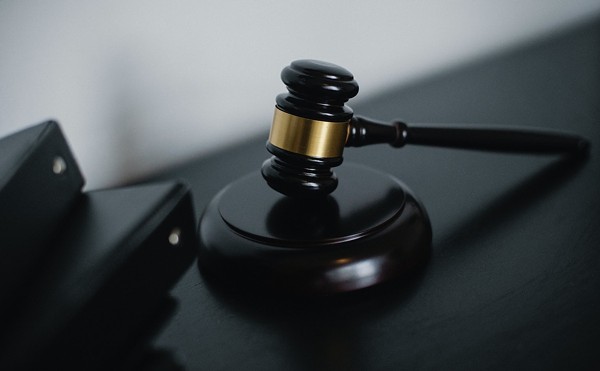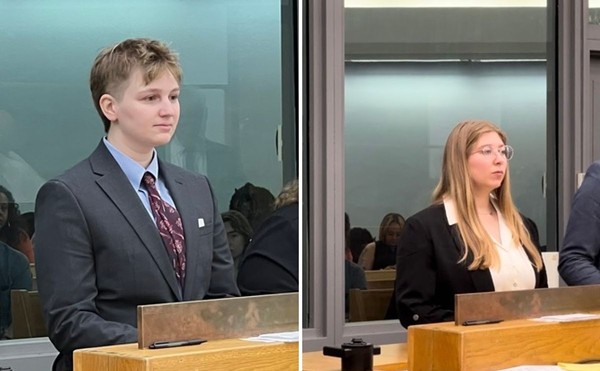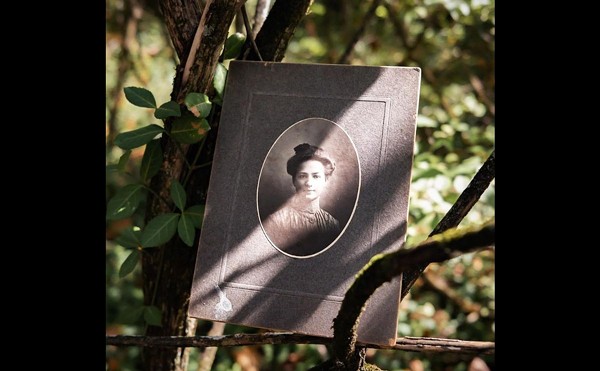|
Police officers did not spray Mace at bar and restaurant patrons strolling through Mount Adams on a recent evening, according to evidence submitted Sept. 24 in Hamilton County Municipal Court. This behavior is in contrast with what officers did June 2, when they arrested nine people walking through Mount Adams in a civil rights protest.
The trial of six of the protesters this week turned into an examination of police conduct during the boisterous but nonviolent march. The defendants in the case are Carwyl James, David Mitchell and Jay Marx, charged with disorderly conduct and resisting arrest; and Catherine Austin, Natalie Nguyen, and Molly Lyons, charged only with resisting arrest.
Defense attorney Kenneth Lawson has tried to put the police on trial, arguing the protesters were arrested for their message — not for any crime.
"We believe that the defendants were specifically arrested not for their conduct, but for their speech, for their symbolic speech," Lawson said.
The trial began in July but was postponed after three days of testimony, resuming Sept. 19. By coincidence, the trial of the protesters resumed as the trial of Officer Stephen Roach, whose killing of an unarmed black youth set off the events leading to the protest, was underway. (See "A Shot in the Dark," page 13.)
Ironically the protesters' trial for allegedly blocking a street and a sidewalk took longer than Roach's trial for negligent homicide.
'He wanted to mace me'
Marx lives in Washington, D.C., and writes for the Independent Media Center. He says he went to Mount Adams to protest unequal enforcement of a citywide curfew during rioting in April.
Some Mount Adams businesses remained open after curfew, attracting television news cameras, as elsewhere in the city more than 600 people were arrested, almost all of them African Americans.
On June 2 , Marx told fellow protesters they didn't have to move when ordered by police, according to testimony by Officer Shawn George. Marx's statements caused a hazard to onlookers and protesters, leading to his arrest for disorderly conduct, George said.
But Marx testified he was not addressing the crowd at all, but only asked officers why they were arresting other people.
Marx refused to put his hands behind his back as he was being arrested, leading to a charge of resisting arrest, George testified.
"He eventually had to be maced before we could get the cuffs on him," George said.
But Marx says George grabbed him by his collar, pulled his hands behind his back and held him as another officer maced him in the face.
City Prosecutor Lura Teass sneered at Marx's account. Surely he didn't think the officer maced him for no reason, Teass said.
"I don't think he had no reason," Marx replied. "I think he wanted to mace me."
Judge Cheryl Grant, who is trying the case without a jury, heard extensive testimony about whether the protesters or police were blocking the streets in Mount Adams. Restaurant owners claim they lost business because of the protest, which lasted about 30 minutes.
The defendants showed a videotape made by Barbara Wolf, showing people walking through the streets of Mount Adams in September. One group walked through the street while a police officer walked in front of them. Then the officer himself started to walk in the street.
"I was videotaping it to demonstrate that the culture of Mount Adams is one of taking your time in the street," Wolf testified.
Teass pointed out the video was not made on the day of the protests. That, of course, was a different day. That was the day when a group of young people gathered in the streets to protest what they saw as a social injustice. Those pedestrians weren't buying beer or sushi or art.
"They were chanting, carrying signs, screaming, yelling," testified Officer Ryan Jones. "They were engaged in a dialogue with members of our command staff."
'They're going to hurt someone'
Lyons, a member of the People's Law Collective, was part of the group. The night before the protest, she testified, organizers explained they didn't want to see any property harmed or people arrested. Their first wish came true.
When the protesters gathered at Seasongood Pavilion before setting out for Mount Adams, police were already there. Assistant Police Chief Richard Janke was in command.
A videotape played at trial showed Lyons holding a bullhorn, asking officers what the protesters would be allowed to do.
"I specifically remember (Janke) saying, 'If you get on the sidewalk and continue to move, you'll be able to continue to protest,' " Lyons testified.
Lyons was charged with resisting arrest, for allegedly interfering with the arrest of David Mitchell. Lyons testified her arms were interlocked with Mitchell's through most of the protest. As she saw officers coming towards them, she said, she didn't know they were coming to arrest Mitchell.
"I just kept thinking, 'They're going to hurt someone," she said.
Officers yelled at Lyons to unlock her arms from Mitchell's. But she says she couldn't, because people behind them were holding onto her, and she became entangled.
"I physically could not let go," she said.
Police pulled Lyons from the crowd.
"They tear gassed or maced me in my eyes and then they pulled open my mouth and sprayed it down my throat," she testified. "I was not told I was under arrest until later, maybe five minutes later."
Teass tried to convince the judge that Lyons had been on the street during the march and that other protesters had blocked the street. But Lyons was charged only with resisting arrest, and where she had walked didn't really matter.
"This court is interested in the charge that is before the court," Grant said.
Missteps by Teass seemed to irritate Grant, who at one point said repeated mispronunciations of defendant Natalie Nguyen's name were "driving me crazy."
When Teass made a series of objections during Lawson's cross-examination of police, the judge chided her for not following procedure. Grant warned Teass against arguing with her, then explained how to properly make an objection.
"Unless you went to some other law school, that's how you make an objection," Grant said. "To do otherwise is contemptuous behavior."
Closing arguments were scheduled for Sept. 26. ©





